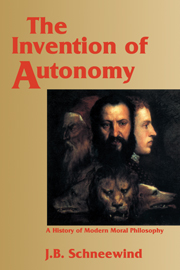Book contents
- Frontmatter
- Contents
- Preface
- Acknowledgments
- A note on references and abbreviations
- Introduction
- Part I The rise and fall of modern natural law
- 2 Natural law: From intellectualism to voluntarism
- 3 Setting religion aside: Republicanism and skepticism
- 4 Natural law restated: Suarez and Grotius
- 5 Grotianism at the limit: Hobbes
- 6 A morality of love: Cumberland
- 7 The central synthesis: Pufendorf
- 8 The collapse of modern natural law: Locke and Thomasius
- Part II Perfectionism and rationality
- Part III Toward a world on its own
- Part IV Autonomy and divine order
- Epilogue
- Bibliography
- Index of names
- Index of subjects
- Index of biblical citations
5 - Grotianism at the limit: Hobbes
Published online by Cambridge University Press: 05 June 2012
- Frontmatter
- Contents
- Preface
- Acknowledgments
- A note on references and abbreviations
- Introduction
- Part I The rise and fall of modern natural law
- 2 Natural law: From intellectualism to voluntarism
- 3 Setting religion aside: Republicanism and skepticism
- 4 Natural law restated: Suarez and Grotius
- 5 Grotianism at the limit: Hobbes
- 6 A morality of love: Cumberland
- 7 The central synthesis: Pufendorf
- 8 The collapse of modern natural law: Locke and Thomasius
- Part II Perfectionism and rationality
- Part III Toward a world on its own
- Part IV Autonomy and divine order
- Epilogue
- Bibliography
- Index of names
- Index of subjects
- Index of biblical citations
Summary
Grotius removed natural law from the jurisdiction of the moral theologian, to whom Suarez assigned it, and made its theory the responsibility of lawyers and philosophers. Numerous Protestant writers on ethics and the foundations of politics followed him in using the language of natural law while detaching it from the specific doctrines of any particular religious confession, whether Protestant or Catholic. If in a broad sense they are all Grotians, some of them accepted more from the master than others. There were, of course, commentators and interpreters who confined themselves to explaining and defending Grotius's view. The Grotians who made a difference, however, did more than that.
In this chapter and the next I consider two Protestant natural law theorists who took Grotianism to its limits, or beyond: Thomas Hobbes and his critic, Richard Cumberland. Both of them were widely read, but neither founded a school. Insofar as there was a Grotian orthodoxy beyond the writings of the commentators, it derived from the position elaborated by Samuel Pufendorf, which I discuss in Chapter 7. Departing on some matters from Grotius, Pufendorf avoided the extreme positions of both Hobbes and Cumberland. He was accused of being a political trimmer in his life and an eclectic in his theory, but he became the most widely studied natural law theorist identified as a Grotian.
- Type
- Chapter
- Information
- The Invention of AutonomyA History of Modern Moral Philosophy, pp. 82 - 100Publisher: Cambridge University PressPrint publication year: 1997

